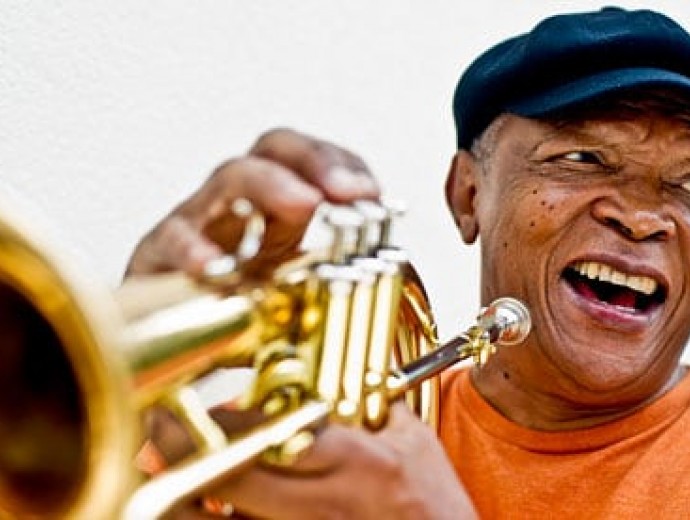Paying homage to Bra Masekela – as he was popularly known to many – is much more than just paying tribute and respect to his music and musical abilities. Although that in itself is probably his greatest achievement as a human being, there are other great attributes of the great man we should not forget. His fight against the evil system of apartheid, his long fight against alcoholism and drugs (in his own personal life), in later years his courageous fight against cancer, his sociability/humanness (or, if you like, his ubuntu-ness), his concern for other people of illhealth through his campaign in encouraging people to go for early checkups to avoid, perhaps, what he suffered, his loud and vocal protests against injustice and poverty; these are just a few examples of Hugh Masekela’s involvement in the country and its people that he so much revered and loved.
I would like to share with you two personal encounters I had with Mr Masekela, which left an indelible impression on me.
The first time I saw him in the flesh was way back in 1959 when the first black musical, King Kong (which, by the way, also featured Miriam Makeba in a leading role), played in Cape Town. Hugh was part of the music ensemble. I was a student at the University of Cape Town at the time. What struck me about him – beside his talent – was his self-assuredness, his brazenness. You should bear in mind that this was apartheid South Africa in 1959 where blacks were supposed to be
inconspicuous, and not heard. The few of us of colour (meaning non-whites) that were present at the performance were only allowed to attend because – as I seem to remember – the musical was performed on the university premises, which meant non-whites could not be denied entry. In other words, there was a gap in the law which somehow could not prevent separation on racial lines in certain instances. I should further explain that I was allowed to attend the (white) university because there was no other higher educational institute for people of colour (like myself) in the Cape Town area at the time. The University of the Western Cape had not yet been built. So, there I was among these ‘liberal’ whites in the audience and seeing with my own eyes artists who later would become colossal figureheads in their own right. At the time, I was a timid student who, through watching Hugh and co., learned to work on my own courage and assuredness in standing up to the
oppressors.
The next time I met Bra Hugh was in Amsterdam in 1982. The anti-apartheid movement in the Netherlands (AABN), together with ANC, organised a big and very successful cultural festival called Culture in Another South Africa. South African exile-artists together with invited anti-apartheid artists from South Africa itself met and performed together. This bold meeting – this crossing of paths – was the first time South African cultural celebrities from home and abroad came together outside South Africa to discuss the political and cultural present and future of their country. I formed part of the exiles who helped in the realisation of this very great undertaking. So – behind the scenes as it were – I met Hugh Masekela, who was one of the exile-artists, for the second time in my life. He had just flown in from the USA, fresh from his musical successes there, well-dressed, debonair, charming and, above all, self-assured – all traits that became associated with him until his death. Personally, he played a big role in my getting close to the top brass of the ANC in order for me to help in facilitating the organisational and presentational part of the conference. Of course, from a musical point of view – with greats such as Dollar Brand (Abdullah Ibrahim), Jonas Gwangwa, and Basil Coetzee – Hugh Masekela with horn, piano renditions and vocals was one of the highlights of the conference.
I had the privilege of seeing him perform again in 2009 and 2014 at the Haus der Kulturen der Welt in Berlin. All my memories of these brief, but lasting, encounters remain fresh in my mind and I am proud to have had the privilege of getting so close to one of our greatest South Africans. Bra Masekela you will always be with me, in mind and spirit!
Arnold Isaacs
Chairperson, Mayibuye Südafrika Community e.V.

